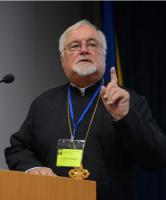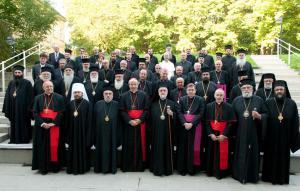Online discourse of the IES’ President Rev. Iwan Dacko on Theological Catholic-Orthodox Commission
An eyewitness and an active member of the Joint International Commission for Theological Dialogue between the Catholic Church and the Orthodox Church father Iwan shared online his thoughts and hopes with the DLMPES’ students regarding the activities, challenges and perspectives of the catholic-orthodox dialogue on October 24.
Being a member of the Joint International Commission for Theological Dialogue between the Catholic Church and the Orthodox Church since 2005 father Iwan Dacko started his lecture with the brave history of the renewal of the ecumenical movement in the XX century. The II Vatican Council and the further encounter of the pope Paul VI and the Patriarch Athenagoras I became important positive shifts in the conscience of the Catholic and Orthodox Churches. The concept Church-Sister became introduced in the official language of the Churches. The desire to emphasize what is common between western and eastern Christians was realized by creating International theological commission between Catholic and Orthodox Churches.
The main achievements of the commission according to fr. Dacko was a cherishing the spirit of friendship and openness between the members belonging to different Christian denominations. Father Iwan stressed that one of the best fruits of the commission was the Ravenna Document in 2007 Ecclesiological and Canonical Consequences of the Sacramental Nature of the Church. Ecclesial Communion, Conciliarity and Authority.
The main challenges in the present stage of the dialogue between Catholics and Orthodox is the question of the role of pope in the universal Church. Members of the commission explore and discuss the role of pope in the first millennium.
Rev. Dacko emphasized the important role of the Eastern Catholics (Byzantines and Orientals in union with Rome) at the ecumenical dialogue, because if their ecclesiological, pastoral and theological contribution is to be re-evaluated and re-thought then they could become a model for the future unity between Churches.



